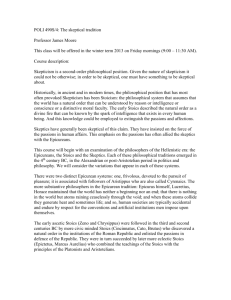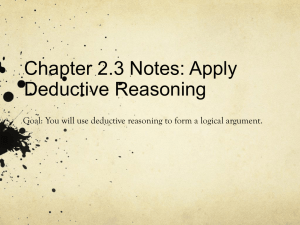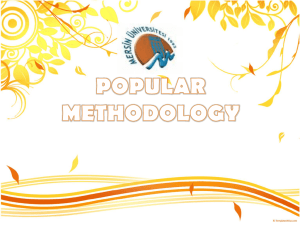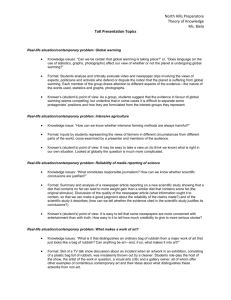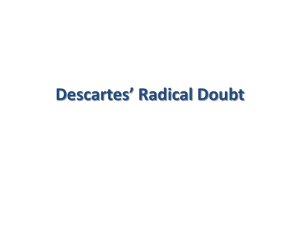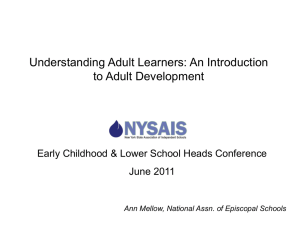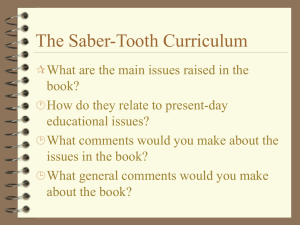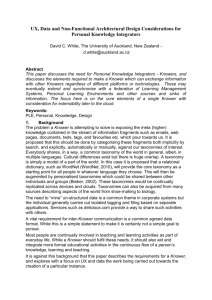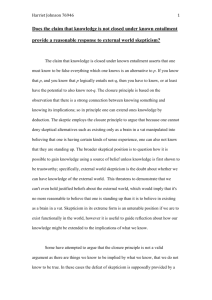Role of the Skeptic
advertisement
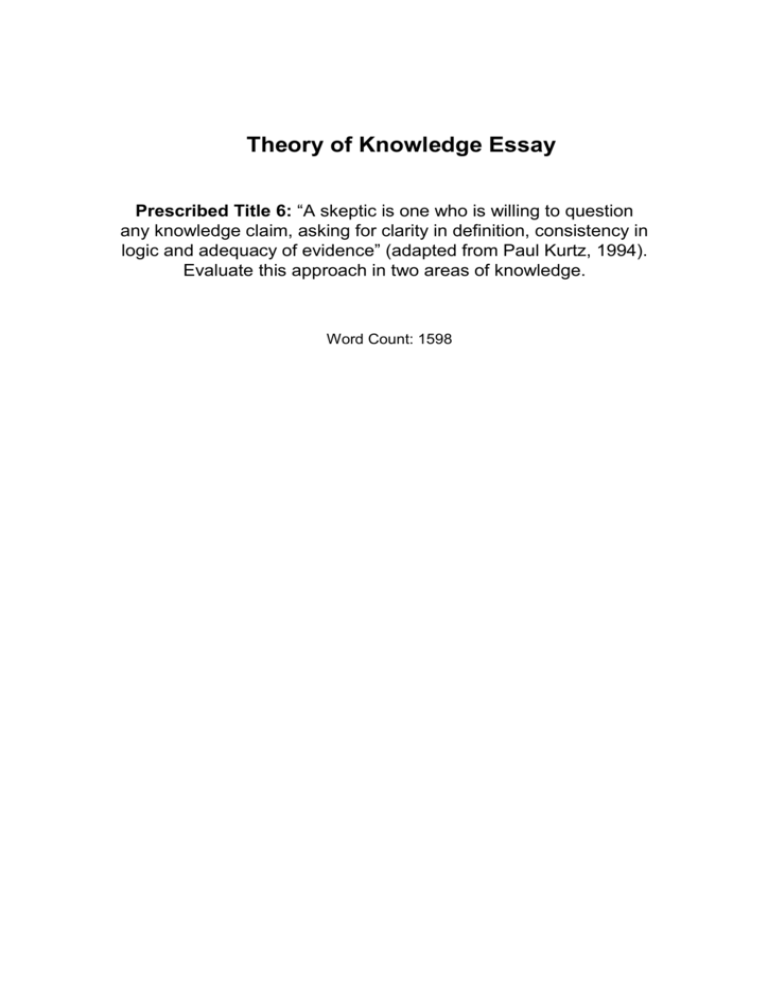
Theory of Knowledge Essay Prescribed Title 6: “A skeptic is one who is willing to question any knowledge claim, asking for clarity in definition, consistency in logic and adequacy of evidence” (adapted from Paul Kurtz, 1994). Evaluate this approach in two areas of knowledge. Word Count: 1598 2 Smit Essay: As the ‘father of secular humanism’ the quote: “A skeptic is one who is willing to question any knowledge claim, asking for clarity in definition, consistency in logic and adequacy of evidence” explores Paul Kurtz’s personal interpretation of what it is to be a skeptical knower ("Paul Kurtz 1925-2012."). It is assumed that if a knower is unable to accept what is brought forward as a knowledge claim without these elements, they are considered skeptical. We arrive at knowledge on the basis of four ways of knowing; reason, emotion, sense perception and language. In order to evaluate the truth of what is claimed to be knowledge, a skeptic primarily assesses accuracy and validity through reason as a way of knowing. Reason is formed on a basis of logic, evidence and critical thinking and is used to justify truth. The validity of Kurtz’s approach in itself may be examined within the Natural Sciences and History as areas of knowledge. Prior to exploring different areas of knowledge, we need to consider why some knowers are more skeptical than others. Skepticism arises from doubt, which arises from assessing truth. Truth as a concept agrees with a knower’s idea of reality and it is considered factual, honest and valid. A ‘true’ knowledge claim is one a knower accepts and believes is correct. Paul Kurtz believes that skeptics question knowledge claims and ask for justification in order to verify their truth. It may be that if a knower has had what they considered to be a true knowledge claim compromised in the past, they may be more skeptical of situations than others, as they are more doubtful of truth. Therefore, it could be assumed that our environment, experiences, cultures, morals and religions have an influence on our level of skepticism. These elements are apparent when forming knowledge claims in all areas of knowledge. In terms of being skeptical of a knowledge claim, it is difficult to quantify or qualify what is considered Theory of Knowledge Essay 3 Smit ‘adequate’ evidence, or whether all three components must be fulfilled to arrive at complete certainty, as this is specific to a knower’s level of skepticism. Skepticism may also depend on other ways of knowing. For example, if a knower relies heavily on emotion, they may value intuition over adequate factual evidence or rely on informal reasoning fallacies to arrive at a conclusion. For instance, a knower may be skeptical of a moral decision on the basis of the emotion it evokes rather than a lack of factual evidence. Clarity in definition, adequate evidence and consistent logic heavily rely on formal reasoning established through deductive methods, drawing specific conclusions from general statements, and inductive methods, forming general conclusions from specific cases (Bastian, Sue, 96) ("Deductive Reasoning vs. Inductive Reasoning"). In the Natural Sciences, formal reasoning is used to form theories and carry out scientific methods. Knower’s within the Natural Sciences could be considered skeptics, who question knowledge claims and seek justifications to support their theories rather than relying on an emotional explanation. Physicists, biologists and chemists follow similar scientific methods where by they conduct empirical research, form hypotheses, test knowledge claims, and then observe and evaluate their results. Scientists use inductive methods to form hypotheses but employ deductive methods to reach a final conclusion based on verifying an invalid or valid hypothesis through testing it. For example, the biological claim that all living things are made up of the smallest unit of life, cells, that come from pre-existing cells comes from studying prokaryotic cells for hundreds of years (Taylor, Stephen). Engineers developed technology, such as the microscope, to aid the collection of evidence that allowed biologists to form knowledge claims. In order for biologists to arrive at a certain conclusion, they used Theory of Knowledge Essay 4 Smit deductive reasoning to form consistent logical connections between propositions that were accumulated through multiple studies using the new technology. Therefore, in this case, to arrive at certainty, scientists primarily relied on formal reasoning, seeking adequate evidence and consistency in logic to justify knowledge claims. Biologists have also established principles that require adequate evidence to accept knowledge claims. The Precautionary Principle states that scientists must prove their actions will not harm the environment or humanity before they proceed with them ("The Precautionary Principle."). In this sense, if a knower is skeptical of a knowledge claim that a scientific creation, such as genetically modified foods, may harm our health or environment, scientists must provide adequate evidence of the contrary to justify the use of it. There is a great level of uncertainty in the Natural Sciences regarding the origin of the Earth, as knowers’ lack clarity in definition surrounding this topic entirely. Knower’s are therefore skeptical to justify knowledge claims of Evolutionism versus Creationism. Individuals may be skeptical of a knowledge claim as they lack adequate evidence to prove divine creation, however, a knowledge claim may still be accepted, as there is inadequate evidence to disprove it. For example, it could be argued that the theory of Evolution has been hypothesized but not necessarily proven to be certain knowledge. Fossils, selective breeding and homologous structures have been put forward as theoretical evidence, however there is a possibility that these theories are wrong and that the true claim has yet been discovered (Taylor, Stephen). Moreover, a lack of sufficient evidence contributes to an unclear definition of the Earth’s origin and enhances skepticism further. As an agnostic individual, I am personally skeptical of all knowledge claims surrounding this topic, as although divine creation seems Theory of Knowledge Essay 5 Smit inconsistent in logic there is inadequate evidence to say that the existence of a higher power may be disproved. Religious individuals may argue that faith is an additional way of knowing. Pertaining to specific knowledge claims, faith may overrule reason and dispute a skeptic’s demand for justification. Such knower’s may disagree with Kurtz’s approach as although they are skeptical of the origin of the Earth, their religious beliefs exceed the will to seek factual logical evidence and clarity in definition as a form of justification. An issue that arises from this topic and overlaps into another area of knowledge is the accuracy of claims from the past and how this may hinder our Historical knowledge. Our Historical knowledge relies on evidence from the past, however it is not easy to elucidate evidence; nor is our evidence always considered adequate or logically consistent. With the accuracy of History, and therefore the validity of it, as an area of knowledge in question, knowers may be skeptical of whether any historical knowledge is true at all. Focusing on terrorism and crime within the past as an example, theories formed through deductive reasoning of events, such as 9/11, are often doubted by conspiracists who believe there is either an inconsistent, or a lack of evidence to support the claims. Media sources provided live video coverage of the attacks on the World Trade Center as well as photos and witness statements, however conspiracies were still formed and the media questioned. These skeptics form their own knowledge claims of what occurred based on sequences of evidence they reason to be consistent in logic, adequate in evidence and clear in definition. One of the greatest theories surrounding these events is the idea that the attack on the Pentagon could not have scientifically occurred based on the dimensions of the plane versus the size of hole it left after colliding (Hoffmann, Jim). Here, skeptics use inductive reasoning from within another area of knowledge to support the idea that inconsistent Theory of Knowledge Essay 6 Smit logic creates doubt in the validity of the knowledge claim and therefore the truth of it is unjustifiable. Knower’s become more skeptical of a historical claim when facts begin to change and knowledge becomes unclear and inconsistent. This is seen through out History and as technology advances it becomes easier to purposely deceive knowers through manipulating historical evidence, making it more difficult to assess truth. For example, anyone is able to access software that allows you to crop, cut and change the speed, colour or audio of visual evidence. Individuals are able to construct personal social media profiles online using altered images and choosing what and what not to display from their pasts, which constructs a false reality of themselves and their lives. The North Korean leader, Kim Jong-Un, was accused of altering photographs to provide false evidence of economic development and military defense weapons in his country ("Altered Images: Questions over Kim Jong-un's 'fuzzy legs."). The validity of the evidence was considered inadequate and the claim doubted. Evolving technology as an environmental factor has strengthened my doubt and skepticism and my need for finer evidence for it be deemed adequate, more consistency for a claim to be considered logical and greater clarity in definition to arrive at a sound justification. It can be assumed that as manipulation goes against developing trust, it produces more skeptical knower’s who are reliant on the combination of theoretically clear definitions, consistent logic and adequate evidence to accept a knowledge claim. In conclusion, in terms of the Natural Sciences and History as two separate areas of knowledge, Paul Kurtz’s theory that skeptics “are willing to question any knowledge claim and ask for clarity in definition, consistency in logic and adequacy of evidence” is true when seeking certainty. Although some knowers arrive at a conclusion relying Theory of Knowledge Essay 7 Smit on faith, skeptics, in definition, are willing to question and ask, as they require some form of formal reasoning to justify a claim, whether that is arrived at through a deductive or inductive method. A skeptic may question a knowledge claim asking for adequate evidence but not seeking consistent logic. Although skeptics may arrive at truth without receiving complete clarity in definition, consistency in logic or adequacy in evidence, receiving answers pertaining to these elements disputes doubt, which enhances a knower’s certainty of a knowledge claim. Theory of Knowledge Essay 8 Smit Works Cited "Altered Images: Questions over Kim Jong-un's 'fuzzy legs." BBC. BBC, 11 Oct. 2013. Web. 20 Jan. 2014. <http://www.bbc.co.uk/news/blogsnews-from-elsewhere-24495368>. Bastian, Sue, Vivek R. Bammi, and Craig C. Howard. Theory of Knowledge. Harlow: Pearson, 2008. Print. "Deductive Reasoning vs. Inductive Reasoning." LiveScience. Tech Media Network, 10 July 2012. Web. 20 Jan. 2014. <http://www.livescience.com/21569-deduction-vs-induction.html>. Hoffmann, Jim. "The Pentagon Attack: What the Physical Evidence Shows." 9-11 Research. 9-11 Research, 28 Mar. 2006. Web. 20 Jan. 2014. <http://911research.wtc7.net/essays/pentagon/>. "Paul Kurtz 1925-2012." Paul Kurtz. Institute for Science and Human Values, n.d. Web. 14 Jan. 2014. <http://paulkurtz.net>. "The Precautionary Principle." Environmental Commons. Environmental Commons, n.d. Web. 19 Jan. 2014. <http://environmentalcommons.org/precaution.html>. Taylor, Stephen. "2.1 Cell Theory." i - Biology. WordPress, n.d. Web. 18 Jan. 2014. <http://i-biology.net/ibdpbio/02-cells/cell-theory/>. Taylor, Stephen. "5. 4 Evolution (Core)" i - Biology. WordPress, n.d. Web. 18 Jan. 2014. <http://i-biology.net/ibdpbio/02-ecology-and-evolution/evolution/>. Theory of Knowledge Essay
